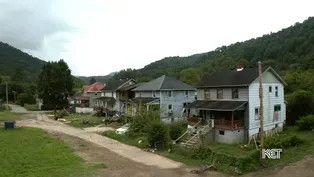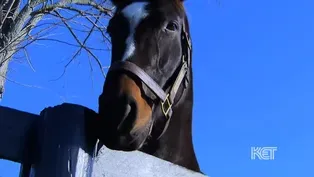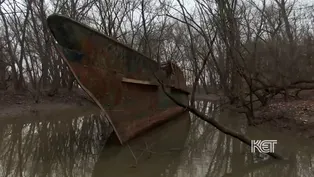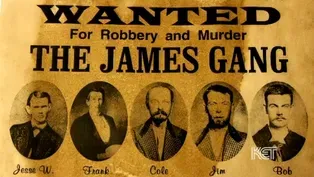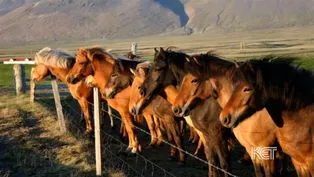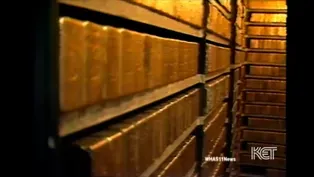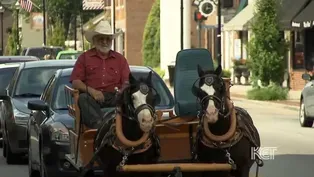
Jesse James in Kentucky
Clip | 7m 45sVideo has Closed Captions
Jesse's gang robbed a Kentucky bank again on April 29, 1872.
Jesse's gang hit a Kentucky bank again on April 29, 1872, when they robbed the Deposit Bank of Columbia, and killed an unarmed cashier. On Sept. 3, 1880, they held up a stagecoach on the road from Mammoth Cave to Cave City. The Russellville bank robbery is re-enacted every year at the Logan County Tobacco and Heritage Festival.
Problems with Closed Captions? Closed Captioning Feedback
Problems with Closed Captions? Closed Captioning Feedback
Kentucky Life is a local public television program presented by KET
You give every Kentuckian the opportunity to explore new ideas and new worlds through KET. Visit the Kentucky Life website.

Jesse James in Kentucky
Clip | 7m 45sVideo has Closed Captions
Jesse's gang hit a Kentucky bank again on April 29, 1872, when they robbed the Deposit Bank of Columbia, and killed an unarmed cashier. On Sept. 3, 1880, they held up a stagecoach on the road from Mammoth Cave to Cave City. The Russellville bank robbery is re-enacted every year at the Logan County Tobacco and Heritage Festival.
Problems with Closed Captions? Closed Captioning Feedback
How to Watch Kentucky Life
Kentucky Life is available to stream on pbs.org and the free PBS App, available on iPhone, Apple TV, Android TV, Android smartphones, Amazon Fire TV, Amazon Fire Tablet, Roku, Samsung Smart TV, and Vizio.
Providing Support for PBS.org
Learn Moreabout PBS online sponsorshipOne of the biggest challenges of telling the story of Jesse James Time in Kentucky is sifting the facts from the legend.
And as researcher Harold Edwards tells us, the James family roots ran deep into bluegrass.
Jesse's parents were born here.
Their father was a Baptist pastor, preacher from Danville, Kentucky.
His mother was thrilled to coal.
She was from around Midway, Kentucky.
They met at a revival.
He was preaching in Lexington, Kentucky, around 1842.
They got married and moved to Clay County, Missouri.
Both Jesse and his older brother, Frank were swept up in the tide of the Civil War and the brutal guerilla warfare in the West, including right here in Kentucky.
They had gotten a good background of banditry during the Civil War.
And as they as they lived their outlaw years, those skills they learned during that time became very useful to them.
Frank and Jesse came here after the war, primarily because they had friends and family here.
One of the first opportunities the James Gang got to employ those skills took place in 1868 in the small community of Russellville, Kentucky.
Six men rode up to the Russellville Bank and they ran Long Bank.
They'd been there before.
They had scouted the territory pretty well.
They'd been in the bank before.
They walk in and ask for change for a $50 bill and the cashier gets nervous or the man pull a gun and he takes off for the door and they shoot at him.
They actually graze the scalp.
The bullet lands in the wall.
He runs out the back.
They grab the money.
$9,000.
About 3 to $5000 in gold and silver.
And they brought out and terrorizes the citizens of Russellville.
No one was expecting anything like that to happen.
Such a bold and brazen act in broad daylight, something they'd never experienced before.
The daring heist was just the beginning.
Four years later, the robbery of the Bank of Columbia, Kentucky, turned deadly.
Two of them entered the bank.
Cashier R A.C. Martin was sitting by his desk as they burst in.
For some unknown reason, one of the robbers shooting, they drug him to the vault.
He probably wasn't in a condition to open the vault, but he had given his word that after the Russellville robbery, that he would not open the safe for anyone.
And he did.
They rode out to Barksdale straight after they left the bank.
They came upon a farmer by the name of Conover, William Conover.
And he was standing near a gate.
And Mr. Conover did not have any idea of what was happening or who they were, what was going on.
And they rode up and they said, Open the gate.
And he said, Boy, she want to get up and get out.
Open it yourself.
They pulled their guns and stuck it in his face and said, we said, open the gate.
And he said, Well, sure, boys, I'll open the gate.
And he opened the gate and they rode on.
And bless his heart, he stuck with the name for the rest of his life.
Open the gate, Conover.
Through the years, Jesse James continued to crisscross Kentucky, often with the law close behind.
One fateful day in Bardstown, their paths converged.
Dolores Yankee Bly, the detective from Louisville.
George Hunter, who was the sheriff of Bardstown, and a couple of other men, had found out that the James boys were in town staying with Donnie Pants.
The two James's and Donnie were in the Central Hotel eating lunch one day.
A young man by the name of Ben Johnson came up the street and he saw them coming and he thought he would warn them that they were out there.
He went in the back and he told them.
He said, The is out here.
He said, I'm afraid there's going to be trouble.
And Jesse and Frank told Donnie said, we've never went out the back door before and we're not going out it today.
We're going out the front door.
So as the detectives came into the lobby of the hotel, Jesse was the first one to walk to the door.
He put his hands on his revolvers under his coat, stood them, looked at him slowly, walked to the door, got to the front door and stopped and turned around.
His brother Frank came out the exact same thing.
Detectives just stood there and looked at him.
They asked him later, You know, you had your chance.
Why did you make your play at them?
And they said, well, they were expert gunmen and we thought we were outnumbered and we thought we'd better let them walk.
Good choice.
Despite the close calls, Jesse continued to target the region.
And in 1880, the legendary outlaw set his sights on the stagecoach at Mammoth Cave.
The stagecoach ran from Cave City, Kentucky, to Mammoth Cave to haul tourists, and they were sometimes two or three stages running at the same time.
It was a very popular attraction.
Even back then, as they were riding in the stagecoach named Florida, they were eight passengers.
Judge Rutherford Roundtree, his daughter Lizzy, was on the stage and they were from Lebanon, Kentucky.
And as they noticed, as they rounded a curve there in the road, they saw two men running alongside the stage, getting ready to pull a stage over.
They stopped the stage, ordered their own people out, except Lizzie.
Judge Roundtree was robbed of his watch and all this money.
And something unusual happened.
These two bandits asked for their names.
So he wrote all their names down.
Said if they'd had a pretty good holiday, they might send some of the stuff back.
But of course, that didn't happen.
They let them get back on the stage, and right away they took Lizzie's rings and judge ran through his watch when Jessie was shot.
And so he.
Joseph, Missouri by Bob Ford.
Later he had that watch on his person and his wife.
They had Lizzie's rings and they were sent back to the family.
Through the years, the exploits of Jesse James became the stuff of dime store novels.
And the Outlaw assumed the role of a modern day Robin Hood.
For Harold Edwards, the comparison doesn't ring true.
I know of no instances where he robbed from the rich and gave to the poor in any way.
I think Jessie was about Frank and Jessie.
Eventually giving up the outlaw life.
Frank James tried his hand at a variety of jobs, including here at the New Salem Baptist Church in D12.
For a short while, Frank was amazingly a Sunday school teacher.
When he came there to teach.
They would turn the chairs around the room so that he wouldn't have his back to the door because he had was so nervous about being anywhere that he couldn't see the door, that he couldn't couldn't teach unless they changed the room around for him.
In credibly over 130 years after his death, the legend of Jesse James is as popular now as ever.
There was one article that Harry had said it was more historical markers put up to Jesse James other than Abraham Lincoln than any other American.
So we have this.
We have this interest in him because of his bigger than life status.
I'm not sure that I can fully understand explain why that there's the interest in the James's.
I don't think they could either.
I think they'd be amazed if they were alive today.
Video has Closed Captions
Clip | 13m 40s | The 2022 devastating flooding in Eastern Kentucky and how the community is recovering. (13m 40s)
Video has Closed Captions
Clip | 16m 35s | In the summer of 2022, Kentucky-based rock band Mojothunder visited our KET studio in Lexi (16m 35s)
Zenyatta (Thoroughbred Racehorse)
Video has Closed Captions
Clip | 7m 30s | In 2009, Zenyatta became the first filly ever to win the Breeders' Cup Cup Classic. (7m 30s)
Video has Closed Captions
Clip | 7m 10s | The 100-year history of the infamous USS Sachem that now sits in a creek in Kentucky. (7m 10s)
Video has Closed Captions
Clip | 4m 30s | 9 distinct regions in the Bluegrass -- defined by culture, characteristics, and traditions (4m 30s)
Video has Closed Captions
Clip | 7m 45s | Jesse's gang robbed a Kentucky bank again on April 29, 1872. (7m 45s)
Video has Closed Captions
Clip | 7m | Icelandic horses may be the purest horse breed in the world. (7m)
Video has Closed Captions
Clip | 7m 28s | Captivating inside stories about the depository's history and significance. (7m 28s)
Video has Closed Captions
Clip | 7m 2s | Meet teen-age sisters who have won countless horse barrel racing titles. (7m 2s)
Bardstown, KY Named "Most Beautiful Small Town In America"
Video has Closed Captions
Clip | 8m 2s | Bardstown, Ky was named "Most Beautiful Small Town in America" (8m 2s)
Providing Support for PBS.org
Learn Moreabout PBS online sponsorshipSupport for PBS provided by:
Kentucky Life is a local public television program presented by KET
You give every Kentuckian the opportunity to explore new ideas and new worlds through KET. Visit the Kentucky Life website.
